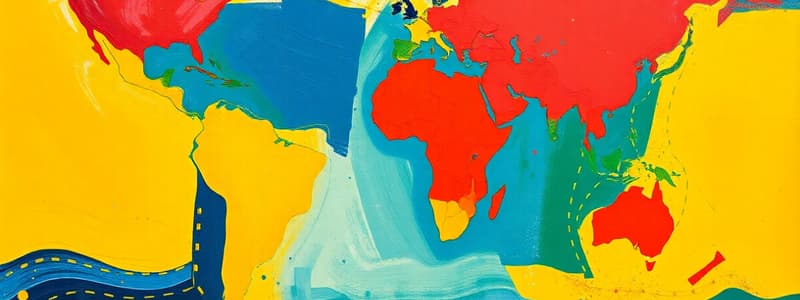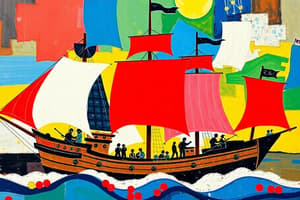Podcast
Questions and Answers
What was a primary economic motivation for the Age of Exploration?
What was a primary economic motivation for the Age of Exploration?
- Desire for new trade routes (correct)
- Discovery of new lands
- Competition among European powers
- Spread of Christianity
Who is recognized for leading the first expedition to circumnavigate the Earth?
Who is recognized for leading the first expedition to circumnavigate the Earth?
- Vasco da Gama
- John Cabot
- Christopher Columbus
- Ferdinand Magellan (correct)
Which technological advancement greatly improved navigation during the Age of Exploration?
Which technological advancement greatly improved navigation during the Age of Exploration?
- Use of the astrolabe (correct)
- Creation of the magnetic compass
- Invention of the steam engine
- Development of the caravel
What was one significant consequence of the Age of Exploration for indigenous peoples?
What was one significant consequence of the Age of Exploration for indigenous peoples?
What major global impact did the Age of Exploration have?
What major global impact did the Age of Exploration have?
What was a significant technological advancement that facilitated maritime exploration during the Age of Exploration?
What was a significant technological advancement that facilitated maritime exploration during the Age of Exploration?
What major impact did the establishment of trade networks during the Age of Exploration have on indigenous populations?
What major impact did the establishment of trade networks during the Age of Exploration have on indigenous populations?
Which explorer is noted for first reaching India by sea from Europe?
Which explorer is noted for first reaching India by sea from Europe?
What type of ship was developed during the Age of Exploration that contributed to more efficient maritime travel?
What type of ship was developed during the Age of Exploration that contributed to more efficient maritime travel?
Which consequence of the Age of Exploration contributed to a shift in global power dynamics?
Which consequence of the Age of Exploration contributed to a shift in global power dynamics?
Flashcards are hidden until you start studying
Study Notes
Age of Exploration
-
Time Period: Late 15th century to early 17th century (approximately 1450 to 1750).
-
Key Motivations:
- Economic: Desire for new trade routes to access spices, silk, and other goods.
- Political: Competition among European powers for territory and influence.
- Religious: Spread of Christianity and countering Islam.
-
Major Explorers:
- Christopher Columbus (1492): Reached the Americas; sponsored by Spain.
- Ferdinand Magellan (1519-1522): Led the first expedition to circumnavigate the Earth.
- Vasco da Gama (1498): First to sail directly from Europe to India, opening trade routes.
- John Cabot (1497): Explored North America under the English flag.
-
Significant Discoveries:
- Americas: European awareness of the New World increased.
- Pacific Ocean: Magellan’s expedition revealed its vastness and numerous islands.
- Sea routes around Africa to Asia (Cape of Good Hope).
-
Impact on Indigenous Peoples:
- Colonization: Establishment of European settlements often led to the displacement of native populations.
- Cultural Exchange: Introduction of new crops, animals, and technologies.
- Diseases: Epidemics, such as smallpox, devastated indigenous communities due to lack of immunity.
-
Technological Advancements:
- Improvements in navigation: use of the astrolabe and magnetic compass.
- Development of more seaworthy ships, such as the caravel.
-
Consequences:
- Shift in global trade dynamics towards Europe.
- Emergence of the Atlantic Slave Trade to support labor needs in the colonies.
- Formation of empires (Spanish, Portuguese, and later British and French) and territorial disputes.
-
Cultural Impacts:
- Exchange of ideas, art, and knowledge (Columbian Exchange).
- Influence on language, religion, and culture in colonized regions.
-
End of the Era:
- Transition to colonialism and mercantilism; exploration gave way to exploitation of resources and peoples.
The Age of Exploration
- Time Period: A period of intense maritime exploration, primarily in the late 15th century to early 17th century.
- Key Motivations: A confluence of economic, political, and religious factors.
- Economic: The desire to find new trade routes to access valuable goods like spices and silk from Asia, bypassing the established land routes controlled by the Ottoman Empire.
- Political: The desire for territory and influence, leading to competition between European powers like Portugal, Spain, England, and France.
- Religious: The spread of Christianity and ambitions to counter the influence of Islam.
Prominent Explorers
- Christopher Columbus (1492): A pivotal figure who, under the patronage of Spain, reached the Americas.
- Ferdinand Magellan (1519-1522): Led the first expedition to circumnavigate the globe, a monumental achievement that expanded understanding of the Earth’s geography.
- Vasco da Gama (1498): Found a direct sea route from Europe to India, bypassing the long and dangerous land routes, opening up new trade opportunities with the East.
- John Cabot (1497): Explored North America under the English flag, marking the beginning of British colonial ambitions.
Discoveries and their Impacts
- The Americas: European discovery of the New World, triggering significant cultural, economic, and political changes.
- Pacific Ocean: The vastness and many islands of the Pacific Ocean were revealed through Magellan's circumnavigation voyage, expanding geographical knowledge.
- Sea Routes around Africa to Asia: Discovery of the Cape of Good Hope (Southern tip of Africa) in 1488 by Portuguese explorer Bartolomeu Dias opened up a new sea route to Asia. This route was later utilized by Vasco Da Gama in 1498, paving the way for direct sea-trade between Europe and Asia.
- Impact on Indigenous Peoples: The arrival of Europeans led to dramatic consequences for the indigenous populations of the lands they explored.
- Colonization: Establishment of European settlements often resulted in the displacement of native communities, leading to conflict.
- Cultural Exchange: The mingling of cultures resulted in the introduction of new crops, animals, and technologies, but also contributed to the disruption of traditional ways of life.
- Disease: Epidemics, such as smallpox, decimated indigenous populations due to a lack of immunity, further compounding the impact of European arrival.
Technological Advancements
- Improvements in Navigation: The development of instruments like the astrolabe and magnetic compass significantly enhanced navigation skills, allowing for more precise navigation during long voyages.
- Seaworthy Ships: The caravel, a lighter and nimbler ship, developed by the Portuguese, was suitable for long voyages and exploration of unknown waters, furthering the reach of explorers.
Consequences of Exploration
- Global Trade: The Age of Exploration led to a significant shift in global trade dynamics. European powers gained control over trade routes and resources, establishing their dominance.
- Atlantic Slave Trade: As demand for labor in the colonies increased, the Atlantic Slave Trade emerged, driven by the need for cheap labor to produce cash crops. This heinous system had profound consequences for millions of Africans.
- Formation of Empires: The exploration led to the establishment of empires, such as the Spanish, Portuguese, British, and French. These powers claimed vast territories and resources, often at the expense of indigenous populations, sparking territory disputes and conflicts.
### Cultural Impact
- Columbian Exchange: The exchange of plants, animals, and ideas between Europe, the Americas, and Africa (Columbian Exchange), brought about significant cultural transformations, mixing different knowledge systems, agricultural practices, and cultural practices.
- Colonization's Influence: The colonization of regions by European powers brought new languages, religions, and cultural practices, leading to a blend of cultural influences in the colonized regions.
End of the Era
- Transition to Colonialism and Mercantilism: The Age of Exploration gradually transitioned into an era of colonialism and mercantilism. The focus shifted from exploration to exploitation of resources and control over colonial possessions. This era, marked by the dominance of European powers, brought its own set of challenges and consequences for the global order.
Age of Exploration
- The Age of Exploration spanned from the 15th to the 17th century.
- Explorers were motivated by economic gains from new trade routes and access to wealth (spices, gold).
- Religion, specifically the spread of Christianity after the Crusades, also played a role.
- Advancements in navigation and shipbuilding enabled explorers to venture farther.
Notable Explorers
- Christopher Columbus, sailing under Spain in 1492, discovered the Americas while searching for a westward route to Asia.
- Ferdinand Magellan led the first expedition to circumnavigate the globe, setting sail in 1519 and completing the voyage in 1522.
- Vasco da Gama was the first to reach India by sea from Europe in 1498.
- Prince Henry the Navigator of Portugal sponsored explorations along the African coast, fostering maritime exploration.
Technological Innovations
- The caravel, a new ship design, offered speed and maneuverability, ideal for long voyages.
- The astrolabe, a navigational instrument, helped determine latitude, enhancing accuracy in seafaring
- The compass, a crucial tool for navigation, allowed explorers to determine direction across vast seas.
Global Impact
- European colonization ensued, resulting in cultural exchanges and conflicts.
- Global trade routes expanded, leading to the Columbian Exchange, a vast network of goods, ideas, and diseases exchanged between the Americas and the Old World.
- Many indigenous populations experienced disease, displacement, and exploitation due to colonization.
Lasting Consequences
- European powers, particularly Spain, Portugal, England, and France, rose to prominence.
- Global power dynamics shifted, as Europeans established their influence in new territories.
- Indigenous cultures and societies resisted and adapted to these changes.
Legacy
- The Age of Exploration laid the foundation for modern global interactions, including trade and cultural exchanges.
- It sparks discussions about colonization and its lasting implications on societies worldwide.
Studying That Suits You
Use AI to generate personalized quizzes and flashcards to suit your learning preferences.




